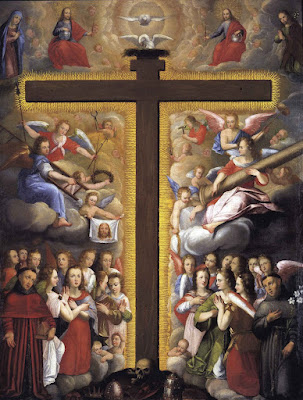St. Jerome was born in the Balkans in 345. He was particularly adept at languages, mastering greek, latin, and Hebrew. His translation of the bible which came to be known as the Vulgate served for centuries as the official translation of the Church for liturgical use and church documents.
The Opening Prayer today refers to St. Jerome’s “living and tender love for Sacred Scripture”. Our love for the scriptures must be alive and active. A living devotion to scripture means we are pursuing it’s knowledge and wisdom daily. We are looking to it to help us in our trials, our dilemmas. It needs to guide the life of the Church, the life of a parish, the life of a family, the life of an individual in his struggle to overcome sin and develop virtue and holiness.
St. Augustine wrote in his Confessions the beautiful words, “Let your scriptures be my delight…O Lord, perfect me and reveal those pages to me! Your voice is my joy. Give me what I love…May the inner secrets of your words be laid open to me when I knock. This I beg by our Lord Jesus Christ in whom are hidden all treasures of wisdom and knowledge.”
Love the scriptures, memorize them, as much as you can. Read difficult passages over and over until they become familiar.
The Catechism of the Catholic Church states, “The Church…specifically exhorts all the Christian faithful. to learn the surpassing knowledge of Jesus Christ by frequent reading of the divine Scriptures. Ignorance of the Scriptures is ignorance of Christ.”
The scriptures are the undergirding of a just society. Where our nation has flourished has been because it has allowed the wisdom of the scriptures to guide its path, where our nation has suffered, has been because we have ignored its lessons, its warnings, its moral guidance.
There is often hesitation on the part of Catholics to be familiar with the Bible. Yet, for those who open its pages, the Scriptures are refreshing, they are consoling, they are instructive, and corrective, they are more valuable than gold. We should read, and meditate on Scripture every day. Having a “living and tender love for Scripture” leads us to a living and tender loving care for God and the willingness to follow his Holy Will.
By studying the Scripture we come to know who we are, who we are meant to be, and so we must not be hesitant to learn How to read the bible, so that we may draw nearer to Christ.
May St. Jerome’s heavenly intercession guide us in our living devotion and tender love of the Scriptures, that we may be equipped for the work of the Gospel and come to the eternal life promised within its pages, for the glory of God and salvation of souls.
- - - - - -
That all Christians may be equipped for every good work by the word of God, that through our love of the scriptures we may grow in wisdom and courage to share the good news.
For the success of our parish RCIA programs, that the uninitiated may seek God and answer his call to holiness.
For our young people, that they may be raised in homes where the Word of God is studied, cherished, and practiced. Let us pray to the Lord.
For all the needs of the sick and the suffering, the homebound, those in nursing homes and hospitals, the underemployed and unemployed, victims of natural disaster, war, and terrorism, for victims of the terrible storms in Florida, for all those who grieve the loss of a loved one, and those who will die today, for their comfort, and the consolation of their families.
For the repose of the souls of our families, friends, and parish, for all of the poor souls in purgatory, and for N., for whom this mass is offered.
Incline your merciful ear to our prayers, we ask, O Lord, and listen in kindness to the supplications of those who call on you. Through Christ our Lord.













